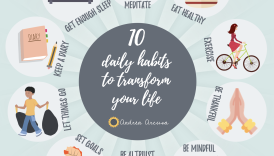10 Simple Tips for a Healthier Lifestyle

Maintaining a healthy lifestyle is more important than ever in today’s fast-paced world. With countless distractions and obligations, it’s easy to let well-being take a backseat. However, the benefits of adopting healthier habits extend beyond mere physical appearance; they encompass mental clarity, emotional stability, and overall wellness. Imagine waking up each day feeling energized, motivated, and ready to tackle whatever challenges come your way. To achieve this desired state, it’s essential to understand that health is a multifaceted journey requiring attention to various aspects.
- 10 Simple Tips for a Healthier Lifestyle
- Key Elements of a Healthy Lifestyle
- Setting Realistic Goals
- Why Realistic Goals Matter
- How to Set Realistic Goals
- Eating a Balanced Diet
- Incorporating More Fruits and Vegetables
- Limiting Processed Foods
- Staying Hydrated
- The Importance of Hydration
- Simple Ways to Stay Hydrated** Incorporating hydration into daily routines doesn't have to be a chore. Here are some effective strategies: - **Carry a Water Bottle**: Keeping a reusable water bottle within reach can serve as a constant reminder to drink more. - **Set Reminders**: Use phone or app notifications to prompt regular water intake throughout the day. - **Infuse Water**: Add fruits like lemon, cucumber, or berries for a flavorful twist that encourages drinking. Prioritizing hydration plays a crucial role in achieving overall wellness. By making conscious efforts to stay hydrated, individuals can optimize their health and enhance their daily lives.
- Prioritizing Regular Exercise
- Cardiovascular Activities
- Strength Training
- Getting Sufficient Sleep
- The Importance of Sleep
- Tips for Improving Sleep Quality** To ensure restorative sleep, individuals may consider the following strategies: - **Establish a Sleep Schedule**: Going to bed and waking up at the same time daily helps regulate the body's internal clock. - **Create a Relaxing Bedtime Routine**: Activities like reading or taking a warm bath can signal the body that it's time to wind down. - **Limit Screen Time**: Reducing exposure to screens before bed can enhance the quality of sleep. By incorporating these practices, individuals can significantly improve their sleep quality, leading to better health and overall well-being. Prioritizing sleep is not just about resting; it's integral to achieving a balanced and healthy lifestyle.
- Managing Stress Levels
- The Impact of Stress
- Strategies for Stress Management** Here are some practical strategies to help manage stress: - **Mindfulness and Meditation**: Practicing mindfulness or meditation can center thoughts and promote relaxation. - **Regular Physical Activity**: Exercise acts as a powerful stress reliever, releasing endorphins and improving mood. - **Connecting with Others**: Spending time with friends and family or seeking support can provide emotional relief during tough times. By actively engaging in these practices, individuals can manage stress more effectively, fostering a healthier lifestyle and enhancing their quality of life. Prioritizing mental well-being is just as important as physical health in the journey to overall wellness.
- Avoiding Harmful Habits
- The Impact of Harmful Habits
- Strategies to Avoid Harmful Habits** To create healthier habits, individuals can consider the following approaches: - **Identify Triggers**: Recognize what situations prompt harmful choices and find alternatives. - **Set Clear Boundaries**: Establish limits around alcohol consumption or social engagements that may encourage negative behaviors. - **Seek Support**: Engage with friends or support groups to stay accountable and motivated to make healthier choices. By actively working to avoid harmful habits, individuals pave the way for a healthier, more fulfilling life. It's essential to recognize that breaking free from negative patterns is possible and will ultimately contribute to long-term wellness.
- Regular Health Check-Ups
- The Benefits of Regular Check-Ups
- What to Include in Your Check-Up** During regular health visits, consider addressing the following: - **Complete Blood Count (CBC)**: Offers insight into overall health and detects a variety of disorders. - **Cholesterol and Blood Pressure Checks**: Essential for cardiovascular health. - **Screenings Based on Age and Risk Factors**: Discuss any specific screenings necessary for your age group or family history. By prioritizing regular health check-ups, individuals empower themselves to take control of their health, leading to informed decisions and a proactive approach to wellness. Remember, routine visits can be a vital part of a comprehensive health strategy that ensures a long, vibrant life.
- Cultivating Social Connections
- The Importance of Social Connections
- Tips for Cultivating Connections** To foster meaningful relationships, consider these strategies: - **Join Clubs or Groups**: Seek out local clubs, classes, or community events that pique your interest. - **Volunteer**: Engaging in volunteer work helps connect with like-minded individuals while contributing to a cause. - **Schedule Regular Catch-Ups**: Make it a point to reach out to friends and family regularly, whether through calls, text messages, or in-person meetings. By nurturing social connections, individuals can enrich their lives, enhance their mental health, and ultimately support a healthier lifestyle. These relationships serve as a robust network that sows the seeds for personal growth and well-being.
Key Elements of a Healthy Lifestyle
Here are some fundamental components that contribute to a balanced approach:
- Setting Realistic Goals: Attainable objectives pave the way for success without overwhelm.
- Eating a Balanced Diet: Nourishment from whole foods fuels the body effectively.
- Staying Hydrated: Water is vital for optimal function; hydration impacts energy levels and mood.
- Prioritizing Regular Exercise: Engage in activities to boost both physical and mental health.
- Getting Sufficient Sleep: Sleep rejuvenates the body and mind, essential for recovery.
- Managing Stress Levels: Stress management techniques help maintain emotional balance.
- Avoiding Harmful Habits: Recognizing and reducing detrimental behaviors are crucial for longevity.
- Regular Health Check-Ups: Proactive healthcare ensures early detection and maintenance of well-being.
- Cultivating Social Connections: Building relationships enhances support systems and emotional health.
As the following sections delve into these components, readers will uncover practical strategies to enhance their well-being and embrace a healthier lifestyle.
Setting Realistic Goals
When embarking on a journey towards a healthier lifestyle, one of the most critical steps is setting realistic goals. Without achievable targets, motivation can wane, leading to frustration and disappointment. Reflecting on personal experiences, a friend once aimed to lose 30 pounds in a month, only to become disheartened when the scale barely budged. By adjusting her goal to a more sustainable two pounds per week, she felt empowered and more successful in her journey.
Why Realistic Goals Matter
Setting goals that are attainable fosters a sense of accomplishment and keeps individuals engaged. Here are some benefits of realistic goal-setting:
- Increases Motivation: Small wins create momentum.
- Reduces Stress: Avoid the overwhelm that comes from impossible objectives.
- Encourages Consistency: Focus on gradual improvements instead of drastic changes.
How to Set Realistic Goals
Consider the following tips:
- Be Specific: Instead of saying “I want to eat healthier,” aim for “I will have a salad for lunch three times a week.”
- Make It Measurable: Quantify goals to track progress, like “I will walk for 30 minutes, five days a week.”
- Set Timelines: Establish a timeframe for each goal to maintain focus.
By articulating clear, achievable goals, individuals are more likely to sustain their commitment to a healthier lifestyle.
Eating a Balanced Diet
As individuals set realistic goals, the next step on the path to a healthier lifestyle is to focus on eating a balanced diet. Food choices play a significant role in overall well-being, affecting not just physical health but also energy levels and mood. A key element in achieving this balance is learning how to incorporate more nutritious foods while limiting those that are less beneficial.
Incorporating More Fruits and Vegetables
Fruits and vegetables are powerhouses of vitamins, minerals, and antioxidants, making them essential components of a balanced diet. A former colleague transformed her eating habits by simply adding one extra serving of fruits or vegetables to each meal. She found that this small change provided her with the energy she needed to stay productive throughout the day. Consider these simple ways to add more fruits and vegetables into daily meals:
- Smoothies: Blend a variety of fruits and leafy greens for a quick breakfast or snack.
- Sneaky Sauces: Add grated zucchini or carrots to sauces or soups without noticing the difference.
- Snack Options: Keep cut fruits or veggie sticks handy for healthy snacking.
Limiting Processed Foods
Processed foods often contain high levels of sugars, unhealthy fats, and ingredients that may not support health goals. For instance, when another friend decided to cut down on processed snacks, she replaced them with homemade versions that satisfied her cravings without the excess additives. Here are tips to limit processed foods:
- Read Labels: Choose items with short ingredient lists, focusing on whole foods.
- Cook at Home: Preparing meals at home gives control over ingredients and portion sizes.
- Plan Ahead: Prepare snacks and meals in advance to avoid last-minute unhealthy choices.
By incorporating more fruits and vegetables while limiting processed foods, individuals can make significant strides toward a balanced and healthy diet that supports their wellness journey.
Staying Hydrated
After focusing on the importance of a balanced diet, it’s essential to consider hydration—an often overlooked yet critical component of maintaining overall health. Water is fundamental to the body’s functions, from regulating temperature to aiding digestion and nutrient absorption. A close friend once realized that her constant fatigue was largely due to inadequate water intake. After committing to drink more water, she noticed a significant boost in her energy levels and mood.
The Importance of Hydration
Staying hydrated not only supports physical health but also enhances cognitive function and emotional well-being. Here are some key benefits of adequate hydration:
- Improved Energy: Reduces fatigue and keeps energy levels steady.
- Enhanced Mood: Proper hydration can positively affect mental clarity and emotional stability.
- Better Digestion: Helps process food efficiently and prevents constipation.
Simple Ways to Stay Hydrated** Incorporating hydration into daily routines doesn’t have to be a chore. Here are some effective strategies: – **Carry a Water Bottle**: Keeping a reusable water bottle within reach can serve as a constant reminder to drink more. – **Set Reminders**: Use phone or app notifications to prompt regular water intake throughout the day. – **Infuse Water**: Add fruits like lemon, cucumber, or berries for a flavorful twist that encourages drinking. Prioritizing hydration plays a crucial role in achieving overall wellness. By making conscious efforts to stay hydrated, individuals can optimize their health and enhance their daily lives.
Prioritizing Regular Exercise
Continuing on the path to a healthier lifestyle, prioritizing regular exercise is essential. Physical activity not only aids in weight management but also boosts mood, enhances energy, and promotes overall well-being. A personal story that resonates with many is when a coworker, initially hesitant about exercise, discovered joy in movement through a local dance class. The combination of fun and fitness made her more engaged than ever.
Cardiovascular Activities
Cardiovascular exercises, or cardio, are vital for heart health and overall endurance. These activities get the heart pumping and improve circulation. Some effective cardio options include:
- Walking or Jogging: Simple and accessible, perfect for any fitness level.
- Cycling: Great for those who enjoy outdoor activities or indoor cycling classes.
- Swimming: A low-impact, full-body workout that’s easy on the joints.
Most experts recommend aiming for at least 150 minutes of moderate-intensity cardio per week.
Strength Training
In addition to cardio, incorporating strength training into the routine is crucial for building muscle, increasing metabolism, and enhancing bone density. A great example is when another friend committed to using resistance bands and bodyweight exercises to strengthen her muscles at home. Here’s how to fit strength training into a weekly plan:
- Bodyweight Exercises: Push-ups, squats, and lunges can be done anywhere.
- Weightlifting: Incorporating dumbbells or kettlebells at least twice a week.
- Circuit Training: Combining strength and cardio for a time-efficient workout.
By blending cardiovascular activities with strength training, individuals can create a well-rounded fitness routine that supports their health goals and enhances their quality of life.
Getting Sufficient Sleep
As individuals engage in regular exercise to enhance their health, another crucial element to consider is sufficient sleep. Quality rest is not just a luxury; it plays a foundational role in physical health, mental well-being, and overall productivity. A friend of mine used to pride herself on functioning well with just a few hours of sleep. However, she quickly learned that after making sleep a priority, her focus and energy levels dramatically improved, allowing her to tackle her day with renewed vigor.
The Importance of Sleep
Getting enough sleep has numerous benefits, including:
- Enhanced Cognitive Function: A well-rested brain improves memory, creativity, and problem-solving skills.
- Better Mood Regulation: Quality sleep positively impacts emotional health and resilience against stress.
- Physical Recovery: Sleep is essential for muscle repair and recovery after workouts.
Tips for Improving Sleep Quality** To ensure restorative sleep, individuals may consider the following strategies: – **Establish a Sleep Schedule**: Going to bed and waking up at the same time daily helps regulate the body’s internal clock. – **Create a Relaxing Bedtime Routine**: Activities like reading or taking a warm bath can signal the body that it’s time to wind down. – **Limit Screen Time**: Reducing exposure to screens before bed can enhance the quality of sleep. By incorporating these practices, individuals can significantly improve their sleep quality, leading to better health and overall well-being. Prioritizing sleep is not just about resting; it’s integral to achieving a balanced and healthy lifestyle.
Managing Stress Levels
Following the importance of getting sufficient sleep, managing stress levels is another crucial aspect of achieving a healthy lifestyle. Stress is an inevitable part of life, but when left unchecked, it can negatively impact physical health, mental clarity, and emotional balance. A close friend experienced this firsthand; during a particularly busy work period, her stress skyrocketed, leading to headaches and sleepless nights. Once she adopted some stress management techniques, she felt a noticeable shift in her overall well-being.
The Impact of Stress
Effectively managing stress can lead to numerous benefits, such as:
- Improved Mental Health: Reduces anxiety and depression symptoms.
- Enhanced Focus: A calm mind can concentrate better and make clearer decisions.
- Lowered Physical Symptoms: Reduces the risk of stress-related conditions, like high blood pressure.
Strategies for Stress Management** Here are some practical strategies to help manage stress: – **Mindfulness and Meditation**: Practicing mindfulness or meditation can center thoughts and promote relaxation. – **Regular Physical Activity**: Exercise acts as a powerful stress reliever, releasing endorphins and improving mood. – **Connecting with Others**: Spending time with friends and family or seeking support can provide emotional relief during tough times. By actively engaging in these practices, individuals can manage stress more effectively, fostering a healthier lifestyle and enhancing their quality of life. Prioritizing mental well-being is just as important as physical health in the journey to overall wellness.
Avoiding Harmful Habits
Continuing from the importance of managing stress levels, another key aspect of maintaining a healthy lifestyle is avoiding harmful habits. Often, these habits can sneak into our daily routines, undermining our health and well-being. A friend of mine kicked a smoking habit after realizing that it not only affected her physical health but also her mental clarity and energy levels. By consciously steering clear of detrimental behaviors, she improved her overall wellness tremendously.
The Impact of Harmful Habits
Harmful habits can lead to serious health consequences, including:
- Chronic Illness: Smoking, excessive drinking, and poor dietary choices can contribute to diseases like diabetes and heart disease.
- Mental Health Issues: Substance abuse can exacerbate anxiety and depression.
- Decreased Quality of Life: These habits often lead to fatigue, poor performance, and lack of motivation.
Strategies to Avoid Harmful Habits** To create healthier habits, individuals can consider the following approaches: – **Identify Triggers**: Recognize what situations prompt harmful choices and find alternatives. – **Set Clear Boundaries**: Establish limits around alcohol consumption or social engagements that may encourage negative behaviors. – **Seek Support**: Engage with friends or support groups to stay accountable and motivated to make healthier choices. By actively working to avoid harmful habits, individuals pave the way for a healthier, more fulfilling life. It’s essential to recognize that breaking free from negative patterns is possible and will ultimately contribute to long-term wellness.
Regular Health Check-Ups
Transitioning from the importance of avoiding harmful habits, regular health check-ups play a crucial role in maintaining overall health and preventing potential issues. Many people, including myself, often underestimate the significance of routine visits to healthcare providers. A friend of mine, who initially saw check-ups as unnecessary, faced a harsh reality when a routine blood test revealed high cholesterol levels. This prompted her to make immediate lifestyle changes that she may not have considered otherwise.
The Benefits of Regular Check-Ups
Routine health check-ups provide numerous advantages, such as:
- Early Detection: Identifying health issues before they escalate can lead to more effective treatment options.
- Preventive Care: Vaccinations and screenings help prevent diseases before they occur.
- Health Monitoring: Regular assessments track progress and keep health goals on target.
What to Include in Your Check-Up** During regular health visits, consider addressing the following: – **Complete Blood Count (CBC)**: Offers insight into overall health and detects a variety of disorders. – **Cholesterol and Blood Pressure Checks**: Essential for cardiovascular health. – **Screenings Based on Age and Risk Factors**: Discuss any specific screenings necessary for your age group or family history. By prioritizing regular health check-ups, individuals empower themselves to take control of their health, leading to informed decisions and a proactive approach to wellness. Remember, routine visits can be a vital part of a comprehensive health strategy that ensures a long, vibrant life.
Cultivating Social Connections
Continuing from the significance of regular health check-ups, cultivating social connections is another vital component of a healthy lifestyle. Strong relationships and social networks are associated with better mental and physical health. A former colleague of mine discovered this truth when she moved to a new city. Initially feeling isolated, she joined a local book club and quickly felt a sense of belonging. Her newfound friendships provided emotional support, which significantly improved her overall happiness and well-being.
The Importance of Social Connections
Building and maintaining social ties offer several benefits:
- Emotional Support: Friends provide comfort during tough times, enhancing resilience against stress.
- Improved Mental Health: Social interactions can reduce feelings of loneliness, anxiety, and depression.
- Motivation for Healthy Behaviors: Engaging with others creates an environment that encourages healthy choices, like exercising together or cooking nutritious meals.




